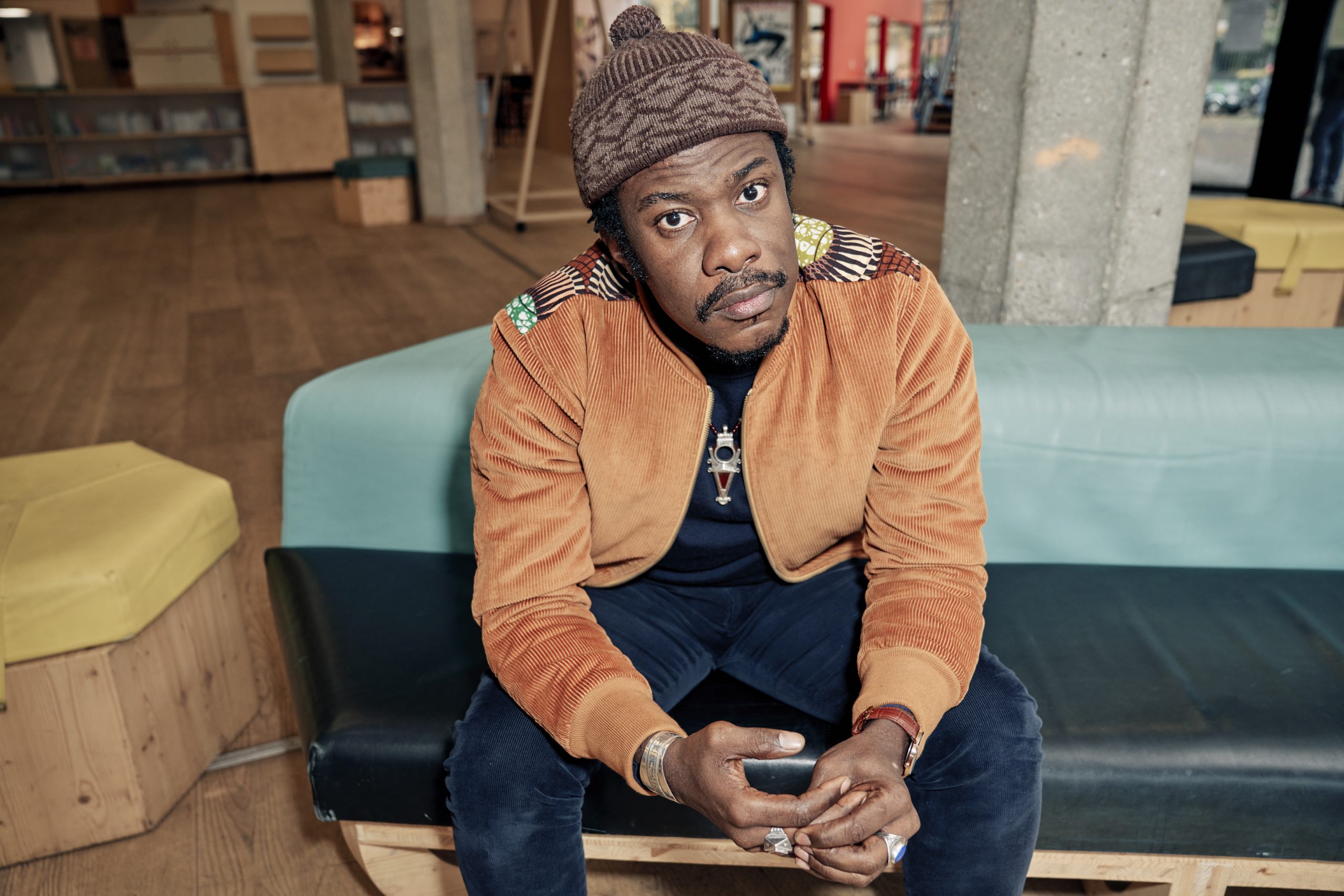Adama Diop
Actor, screenwriter, director, and filmmaker
June-July 2026

- Performing Arts
- New York
“Theater as a space for language and the abolition of boundaries.”
As a Senegalese artist living between Senegal and France, I am interested in hybrid forms in theater. My career began in Senegal as an actor and continued in France. The confrontation with otherness in all its complexity and violence made writing and directing a necessity for questioning the world.
For me, directing is first and foremost about inventing a theatrical language that involves textual and cinematographic material, music, rhythm, and silence. It also involves the search for a strong aesthetic. And working on the question of ritual, which allows me to build a bridge with Senegal and Africa, but also with the invisible world. For me, theater is about summoning the absent, summoning ghosts. And theater is the ultimate place for ritual.
My artistic research is therefore based on exploring forms that abolish the idea of boundaries. It is precisely in response to a world that forces us to be only one thing at a time, wanting to turn us and our works into archetypes or walking clichés.
The idea is to approach our human sciences through art in all its complexity. In fact, we use a wide variety of artistic materials. Even though poetry is my main focus, I enjoy working with different materials, because by exploring multiple art forms, I find unity.
My research will revolve around different areas: literature, music, and cinema.
Winner of 2022 French Syndicate Critics for Best Actor in a Play for his portrayal of Lopakhine in The Cherry Orchard, Adama Diop was born in Senegal in 1981. He has played classical repertoire as well as contemporary writing for the stage under the direction of great names such as Frank Castorf, Julien Gosselin or Tiago Rodrigues. He has also shared the stage or the screen with great actresses such as Isabelle Huppert, Jeanne Balibar, Isabelle Carré or Julia Stiles.
As a writer Adama Diop is a 2021 laureate of Des mots à la scène (From Words to the Stage) with Fajar ou l’odyssée de l’homme qui rêvait d’être poète, his first play that he staged in 2024 and still on tour. His new play The Apocalypse of Adam and Aimée is on tour on 2026. His texts are published by Actes Sud and he is MC2 de Grenoble, CDN de Caen, Malakoff Théâtre 71 associate artist.
He is also the founder et director of EIAD (Dakar International School for Actors and Actresses) in Sénégal.
A few years ago, I came across a text by James Baldwin, The Day I Was Lost. In the foreword, I learned that shortly after Malcolm X’s death in 1965, Columbia Pictures bought the film rights to his autobiography, co-written with Alex Haley, and asked Baldwin to adapt it for the cinema. Several reasons prevented this collaboration from ever seeing the light of day, but the main disagreement was over the choice of actor to play Malcolm X. Columbia wanted a white actor in blackface, the infamous racist practice. For a while, Charlton Heston’s name was bandied about. Baldwin refused to make the film but published his screenplay anyway in 1971. Some time later, Spike Lee’s film was released and, along with the Autobiography, became one of the few sources of knowledge about Malcolm X in Europe.
At this point in my reading, I was already struck not only by the story of Malcolm X, but by the system that was quickly put in place to stage and control the narrative surrounding him. It reminded me of other similar cases, such as Othello, who for centuries was played by white actors in blackface, one of the most famous interpretations being that of Laurence Olivier in 1965.
Timis (Twilight), the title of the show, is the continuation of research I began ten years ago about the legacy of violence. It is the final part of a trilogy that began with Fajar (Dawn), which I created in 2024, and Guddi (Night), a feature film shot in Senegal in December 2025. This research revolves around several questions.
What are we the authors of ? What are we the heirs of ?
How can we rid ourselves of our past, of our histories ? How can we romanticize our silent revolts ?
And who better than Malcolm X to ask these questions ?
The textual structure is crucial in my work. It follows different aesthetics: theatrical, screenwriting, and poetic.
I also like to be as close as possible to my subject, which is why I applied to Villa Albertine. The idea behind this stage for me is to immerse myself for several weeks to focus on researching materials and meeting people. It will also be about trying to find the dramaturgical focus of the show.
I would like to work with a videographer to shoot some footage during my stay. It’s still too early to say whether it will be part of the show, but I think it will be essential to my writing process. Perhaps I should come back with a team to shoot the cinematic parts of the show once the writing is finished.
I would like to meet Malcolm X experts, members of his family, people who knew him, or African Americans who could enlighten me about that era. I would like to meet academics and historians, but also artists and musicians, because an important part of the show will be working on black music from the 1950s, 60s, 70s, and up to the present day : blues, jazz, soul, and hip-hop. These meetings may lead to inviting certain artists to be part of the show.
In partnership with

La Comédie de Caen

MC2 Grenoble

Maison de la Culture de Seine-Saint-Denis Bobigny (MC93)
Through its artistic program, its reputation and its development, the MC93, heir to the ambitious cultural centers desired by the State and supported by local communities, occupies a unique place under the Scènes Nationales label, being both a place of production of shows and open to the international since its inception. Enshrined in popular territory undergoing rapid change, the MC93 has also established the “Experiences Factory” which brings together practical workshops, creative residencies involving local residents, meeting places, and reflections which contribute to renewing the relationship between the institution itself and its members. Since 2015, the institution has been directed by Hortense Archambault, who spearheads a project that aims to make theater a place of endless possibility, a public place that constantly re-examines the question of the commons, taking into account the changes in our society. There is indeed a commonality in our ability to share an aesthetic experience with others, and to understand and confront our differences. Since 2020, it has been a European Production Pole.

Théâtre 71 Malakoff, Scène nationale
https://www.malakoff.fr/280/bouger/vie-culturelle-a-malakoff/theatre-71-scene-nationale.htm


